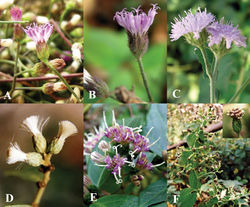Decaneuropsis garrettiana
| Notice: | This page is derived from the original publication listed below, whose author(s) should always be credited. Further contributors may edit and improve the content of this page and, consequently, need to be credited as well (see page history). Any assessment of factual correctness requires a careful review of the original article as well as of subsequent contributions.
If you are uncertain whether your planned contribution is correct or not, we suggest that you use the associated discussion page instead of editing the page directly. This page should be cited as follows (rationale):
Citation formats to copy and paste
BibTeX: @article{Bunwong2014PhytoKeys37, RIS/ Endnote: TY - JOUR Wikipedia/ Citizendium: <ref name="Bunwong2014PhytoKeys37">{{Citation See also the citation download page at the journal. |
Ordo: Asterales
Familia: Asteraceae
Genus: Decaneuropsis
Name
Decaneuropsis garrettiana (Craib) H.Rob. & Skvarla, Proc. Biol. Soc. Washington 120(3): 365. 2007. – Wikispecies link – IPNI link – Pensoft Profile
- Vernonia garrettiana Craib, Bull. Misc. Inform., Kew. 1915: 431. 1915.
Type
Thailand, Lampang, Me Maw, A.F.G. Kerr 2341 (isotype: BM!, isotype: E!, holotype: K!). Fig. 7F.
Description
Climbing or scandent shrubs, young branches terete, inconspicuously ribbed, puberulous. Leaves 9–25 by 4–15 cm, elliptic or obovate, margin entire, apex acute, base cuneate, chartaceous; upper surface puberulous without glands; lower surface puberulous with whip-shaped hairs, cylindrical hairs and capitate glands, lateral veins 4–11-paired; petioles up to 3.5 cm long. Capitulescences terminal and axillary, paniculate. Capitula campanulate, 12–15 mm long, pedunculate. Receptacle flat, 5–5.5 mm in diam., hairy. Involucres campanulate, in 5–6 series, 10–12 mm long, 8–8.5 mm in diam. Phyllaries imbricate, green, margin piliferous, outer surface puberulous without glands; the outer and the middle ones ovate or ovate-lanceolate, obtuse; the inner ones obovate-lanceolate, apex obtuse. Florets 20–30; corollas funnelform, dark purple, glandular; corolla tubes 7–8 mm long; corolla lobes ca. 2 mm long. Anthers 3–3.5 mm long, apical appendage acute, base acute. Styles white, 7–7.5 mm long, branches 3.5–4 mm long. Achenes subterete, 2.8–3 mm long, 10-ribbed, covered with dense hairs without glands. Pappus in 2 series of bristles, the inner ones 6.5–8.5 mm long, persistent.
Distribution
Thailand: Chiang Mai, Chiang Rai, Lampang, Phrae, Kanchanaburi. Myanmar.
Specimens examined
Thailand, Chiang Mai, Doi Chiangdao wildlife sanctuary, 19°24.11'N, 98°55.10'E, 20 Dec 2003, S. Bunwong 75 (KKU); Chiang Mai, Fang, 26 Jan 1973, S. Sutheesorn 2287 (BK); Doi Inthanon, 5 Dec 1969, C.F. van Beusekom & C. Phengklai 2316 (AAU, BKF, C, E, L, P); Muang District, 14 Feb 1990, R. Pooma 386 (BKF); Muang District, 20 Dec 1963, S. Phusamseang 66 (BKF, K, L); Muang District, 12 Dec 1997, W. Pongamornkul 23 (QBG); Muang District, 24 Dec 1997, W. Pongamornkul 48 (QBG); Muang District, 25 May 1995, W. Nanakorn et al. 5337 (QBG); Chiang Rai, Chiang kaung, 10 Jan 1922, H.B.G. Garrett 130 (BK, BKF, K); Thoeng, 23 Jan 1970, S. Sutheesorn 1639 (BK); Kanchanaburi, 15 Jan 1926, A.F.G. Kerr 10216 (BK, BM, K).
Diagnostic characters
Decaneuropsis garrettiana is distinguished from Decaneuropsis cumingiana and Decaneuropsis eberhardtii by its obtuse phyllaries.
Ecology
Mixed deciduous, evergreen or pine-oak forest, alt. 400–800 m; flowering November to February.
Vernacular name
Krue Muang Doi (เครือม่วงดอย).
Taxon Treatment
- Bunwong, S; Chantaranothai, P; Keeley, S; 2014: Revisions and key to the Vernonieae (Compositae) of Thailand PhytoKeys, 37: 25-101. doi
Images
|
